brand
Nigeria gets W’Bank $1.5bn for subsidy removal and an introduction of comprehensive tax policies
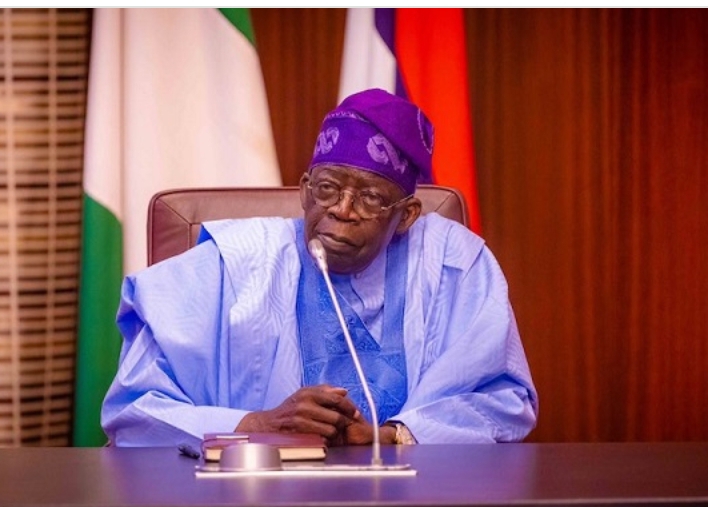
 The World Bank has fully disbursed a $1.5bn loan to Nigeria following the Federal Government’s implementation of key reforms, including removing fuel subsidies and introducing comprehensive tax policies.
The World Bank has fully disbursed a $1.5bn loan to Nigeria following the Federal Government’s implementation of key reforms, including removing fuel subsidies and introducing comprehensive tax policies.
The loan, part of the Reforms for Economic Stabilisation to Enable Transformation Development Policy Financing initiative, is among the fastest disbursements Nigeria has received with both tranches released in less than six months.
According to a World Bank document obtained by our correspondence , the loan was approved on June 13, 2024, with the first tranche of $750m disbursed on July 2, 2024.
The second tranche, tied to the fulfilment of specific economic reform conditions, was disbursed in November 2024.
This rapid disbursement contrasts with other loan programmes, which typically experience delays due to slow or partial implementation of conditions.
For more context, another loan of $750m was approved on the same day (June 13, 2024) for the Accelerating Resource Mobilisation Reforms Programme for Results project in Nigeria.
The World Bank has only disbursed about $1.88m to Nigeria at the time of filing this story, which is less than one per cent of the total approved $750m for the ARMOR project.
Our correspondence further observed that the $1.5bn loan disbursed to Nigeria was structured in two tranches with different maturity periods.
The first tranche was a $750m credit from the International Development Association, featuring a 12-year maturity and a six-year grace period.
The second tranche, a $750m loan from the International Bank for Reconstruction and Development, has a 24-year repayment period with an 11-year grace period.
The World Bank document read, “This document summarises the progress made under the Reforms for Economic Stabilisation to Enable Transformation Development Policy Financing for the Federal Republic of Nigeria (Borrower or Recipient), which was approved by the Executive Directors on June 13, 2024.
“The DPF is a standalone operation comprised of two tranches: (1) first tranche comprising $750m credit from the International Development Association (Association) (Shorter Maturity Loan terms with 12-year maturity and grace period of 6 years, Credit No. 7567-NG); and (2) second tranche comprising $750m loan from the International Bank for Reconstruction and Development (Bank) (US dollar-denominated, commitment-linked loan with 24-year maturity and grace period of 11 years, Loan No.9683-NG).
“The Financing Agreement and Loan Agreement were signed and declared effective on June 19, 2024 and June 26, 2024, respectively. The first tranche was released on July 2, 2024.”
While the document itself did not clearly state when the disbursement for the second tranche was made, further findings by The PUNCH showed that Nigeria got a $750m disbursement from the World Bank in November.
According to the document seen by The PUNCH, a critical reform that unlocked the second tranche was the removal of fuel subsidies.
The World Bank commended the government for not only meeting the condition but exceeding expectations by fully deregulating the fuel market.
The document noted, “In terms of implementation, while the TRC [Tranche Release Conditions] formulation required introducing the change over a specified time-bound implementation period, the Borrower has moved ahead and made the change immediately, thereby overachieving the TRC in this respect.
“Effective October 2024, the price of PMS has been determined by the international market and the exchange rate set by the Central Bank of Nigeria.”
This move has allowed petrol prices to align with international market rates and exchange rates, effectively ending the implicit subsidies that had burdened public finances.
Fuel prices have increased more than fivefold since the reform process began in mid-2023, a change that has drawn both praise for its fiscal prudence and criticism for its impact on living costs.
In addition to removing fuel subsidies, the Federal Government introduced sweeping tax reforms aimed at improving revenue mobilisation.
The Nigeria Tax Bill 2024, submitted to the National Assembly, proposes a gradual increase in the Value Added Tax rate to 10 per cent by 2025, alongside measures to simplify tax compliance and expand input tax credits for businesses.
The document read, “The Borrower has successfully carried out the programme as outlined in the Letter of Development Policy, with progress along all areas supported by the DPF. Following the implementation of the reforms that constituted prior actions for the first tranche of the RESET DPF (disbursed on June 28, 2024), the Borrower continues to carry out the program as planned.
“The borrower has prepared and submitted to the National Assembly on October 3, 2024, a comprehensive package of tax reforms, which not only reform the VAT regime but also simplify tax policy laws and tax administration.
“Reforms have also been implemented to fully deregulate the fuel market, ensuring that retail prices are determined by market conditions and opening the sector to competition. The authorities are following through on their commitment to cease deficit monetization, relying instead on standard debt instruments to finance the deficit.”
There were three key conditions noted in the document, with the first being increasing net oil revenues.
For the first condition, the World Bank noted that there was a Presidential Executive Order that mandated that all fiscal transfers, including crude oil sales and gasoline imports, be executed at the prevailing market exchange rate, with Naira-based transactions starting in October 2024, effectively addressing implicit subsidies.
The second condition was to increase non-oil revenue, and in this regard, the government submitted a draft bill to the National Assembly proposing a VAT rate increase to 10 per cent in 2025, while also allowing input tax credits for capital and services.
The third condition is to ensure social protection delivery was strengthened, and the document noted the submission of an amendment bill mandating the use of the National Social Registry as the primary targeting tool for social investment programs.
The World Bank described the reforms as necessary for diversifying Nigeria’s revenue sources, given the country’s historically low tax-to-GDP ratio.
However, the tax bills have sparked controversy, with northern leaders arguing that the reforms could widen economic disparities between the north and the south.
The disbursement of the $1.5bn loan comes amidst widespread public dissent over the effects of the reforms.
The removal of fuel subsidies has led to soaring petrol prices, significantly increasing transportation and living costs.
Protests erupted in cities like Abuja, Kano, and Lagos, with citizens expressing frustration over rising economic hardships.
President Bola Tinubu and members of his cabinet defended the reforms, describing them as essential for Nigeria’s economic stability and growth.
Tinubu emphasised that the funds saved from the removal of subsidies would be redirected toward infrastructure development, social welfare, and economic diversification.
To mitigate the immediate impact of the reforms, the government has introduced relief measures, including direct cash transfers of N25,000 to 15 million vulnerable households.
However, only about four million households have benefited from this cash transfer programme, which is far below the target.
Also, efforts are underway to promote compressed natural gas as a cheaper alternative to petrol, with a target of converting over one million vehicles in three years to reduce transportation costs.
The World Bank praised the government’s swift and decisive actions, noting that Nigeria’s ability to meet the conditions for both tranches in record time reflects a strong commitment to economic transformation.
The global lender also acknowledged the government’s efforts in addressing structural inefficiencies, such as the high fiscal burden from subsidies and the challenges of revenue mobilisation, calling for sustained reforms.
Amid concerns over rising external debt and the debt service burden, the Federal Government, under the leadership of President Bola Tinubu, has secured loans worth $6.95bn from the World Bank in about 18 months.
The World Bank will decide on three major loan projects for Nigeria in 2025, totalling $1.65bn, as part of efforts to address critical developmental challenges in the country.
The loans, currently in the pipeline, will focus on internally displaced persons, education, and nutrition enhancement.
According to data from the external debt report released by the Debt Management Office, the World Bank’s share of Nigeria’s debt totals $16.32bn, with the majority owed to the International Development Association, which accounts for $16.32bn, which represents 38 per cent of Nigeria’s total external debt.
The International Bank for Reconstruction and Development, another arm of the World Bank, is owed $484.0m, or 1.13 per cent.
brand
GTBank Launches Quick Airtime Loan at 2.95%
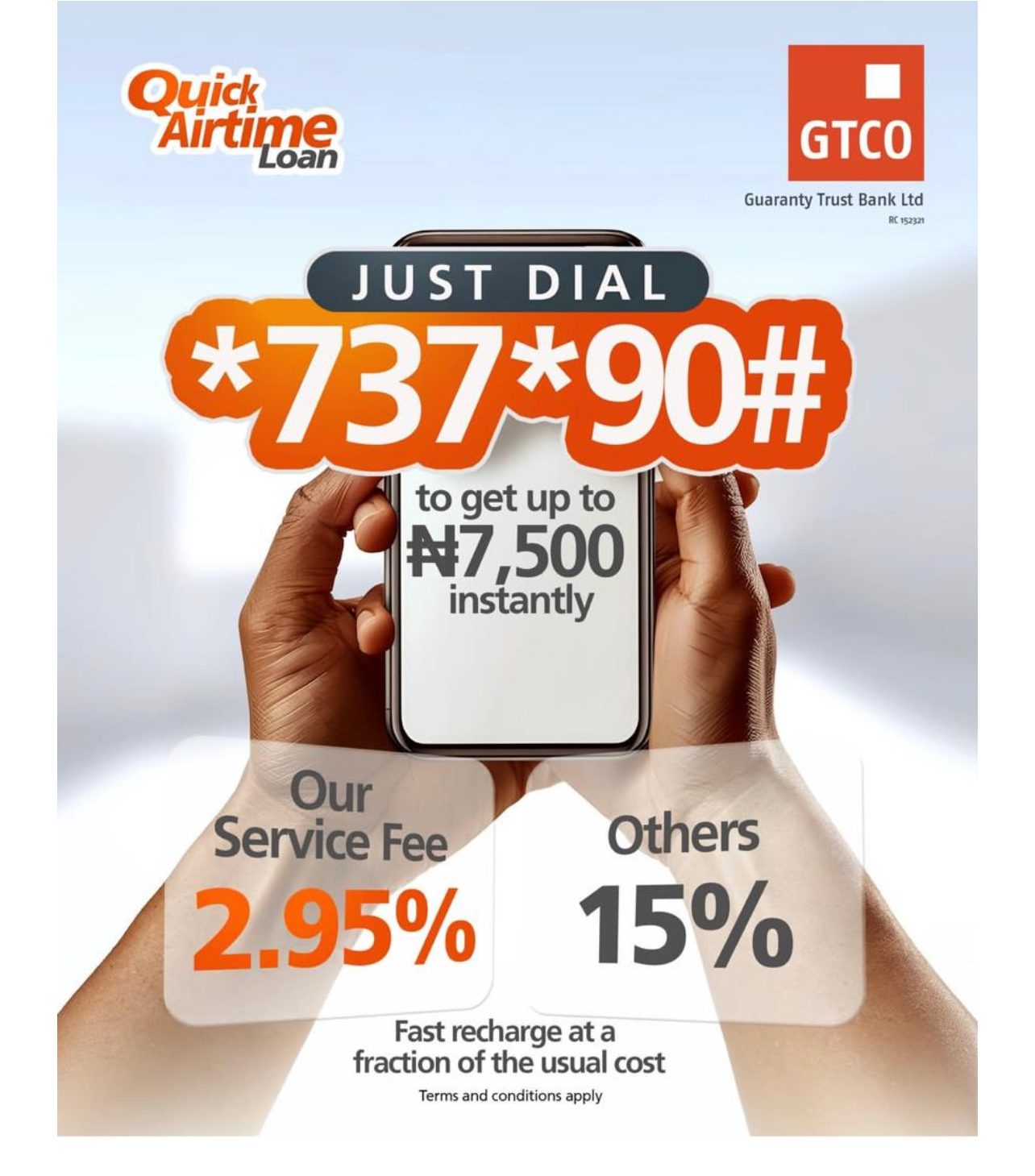
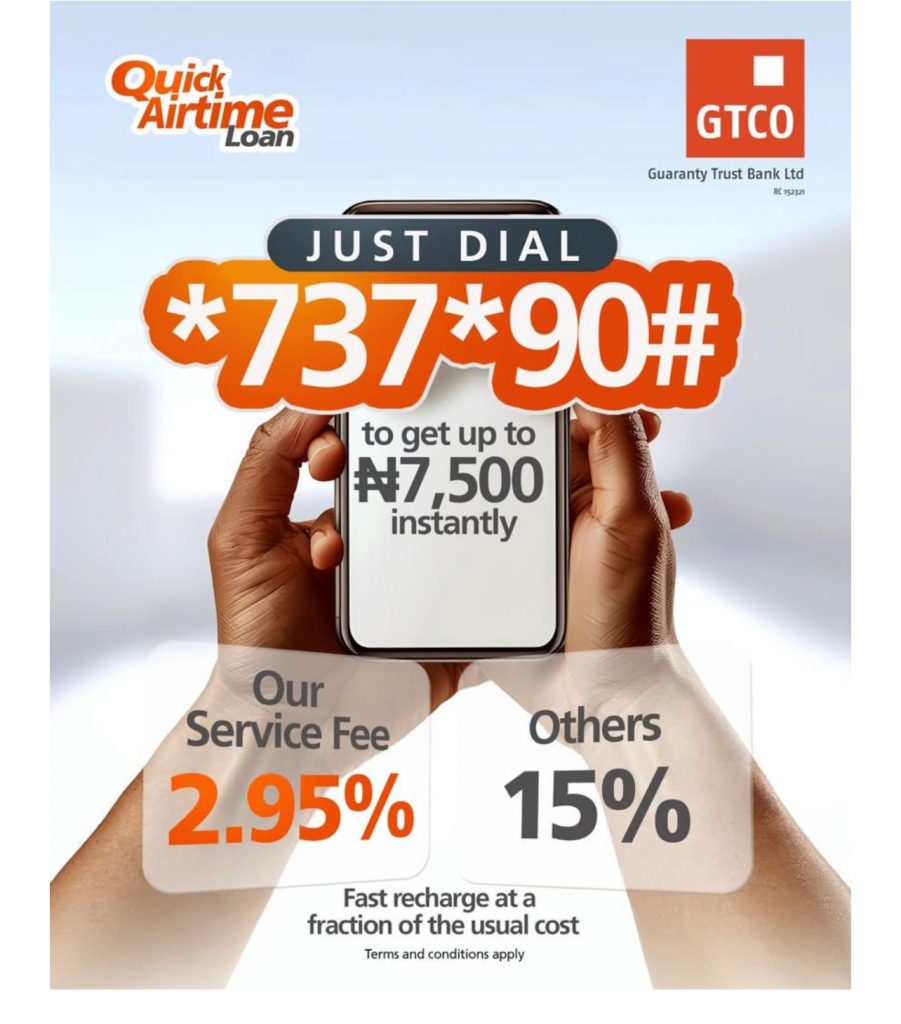
Guaranty Trust Bank Ltd (GTBank), the flagship banking franchise of GTCO Plc, Africa’s leading financial services group, today announced the launch of Quick Airtime Loan, an innovative digital solution that gives customers instant access to airtime when they run out of call credit and have limited funds in their bank accounts, ensuring customers can stay connected when it matters most.
In today’s always-on world, running out of airtime is more than a minor inconvenience. It can mean missed opportunities, disrupted plans, and lost connections, often at the very moment when funds are tight, and options are limited. Quick Airtime Loan was created to solve this problem, offering customers instant access to airtime on credit, directly from their bank. With Quick Airtime Loan, eligible GTBank customers can access from ₦100 and up to ₦10,000 by dialing 73790#. Available across all major mobile networks in Nigeria, the service will soon expand to include data loans, further strengthening its proposition as a reliable on-demand platform.
For years, the airtime credit market has been dominated by Telcos, where charges for this service are at 15%. GTBank is now changing the narrative by offering a customer-centric, bank-led digital alternative priced at 2.95%. Built on transparency, convenience and affordability, Quick Airtime Loan has the potential to broaden access to airtime, deliver meaningful cost savings for millions of Nigerians, and redefine how financial services show up in everyday life, not just in banking moments.
Commenting on the product launch, Miriam Olusanya, Managing Director of Guaranty Trust Bank Ltd, said: “Quick Airtime Loan reflects GTBank’s continued focus on delivering digital solutions that are relevant, accessible, and built around real customer needs. The solution underscores the power of a connected financial ecosystem, combining GTBank’s digital reach and lending expertise with the capabilities of HabariPay to deliver a smooth, end-to-end experience. By leveraging unique strengths across the Group, we are able to accelerate innovation, strengthen execution, and deliver a more integrated customer experience across all our service channels.”
Importantly, Quick Airtime Loan highlights GTCO’s evolution as a fully diversified financial services group. Leveraging HabariPay’s Squad, the solution reinforces the Group’s ecosystem proposition by bringing together banking, payment technology, and digital channels to deliver intuitive, one-stop experiences for customers.
With this new product launch, Guaranty Trust Bank is extending its legacy of pioneering digital-first solutions that have redefined customer access to financial services across the industry, building on the proven strength of its widely adopted QuickCredit offering and the convenience of the Bank’s iconic *737# USSD Banking platform.
brand
GTCO Proudly Headlines the NPA Lagos International Polo Tournament as Main Sponsor— Championing Great Experiences and Heritage


Guaranty Trust Holding Company Plc (GTCO Plc) (NGX: GTCO; LSE: GTCO), one of Africa’s leading financial services groups, is proud to announce its continued support as the main sponsor of the NPA Lagos International Polo Tournament, one of Africa’s oldest and most prestigious sporting events. The 2026 edition will be held at the Lagos Polo Club, Ikoyi, from Tuesday, January 27 to Sunday, February 15, bringing together top local and international polo teams and spectators from across the continent and beyond.
The 2026 NPA Lagos International Polo Tournament will feature top‑tier teams competing for major prizes, including the Majekodunmi Cup, Independence Cup, Open Cup, Silver Cup and Low Cup, among others. Guests can expect a fusion of thrilling equestrian action, polo-inspired lifestyle showcase, and curated hospitality experiences. The event will also be livestreamed, allowing audiences online to share in the excitement and spectacle.
Commenting on GTCO’s role as main sponsor of the Lagos International Polo Tournament, Segun Agbaje, Group Chief Executive Officer, said: “This tournament, one of the oldest in Africa, celebrates not only the noble sport of polo but the values we hold dear as a brand: teamwork, discipline, fair play, and a commitment to excellence. Beyond the field, it showcases Nigeria and Africa to a global audience, reinforcing the continent’s place on the world stage. Our longstanding sponsorship of the NPA Lagos International Polo Tournament reflects our conviction that sport can amplify opportunity, foster connections, and deliver world-class experiences for all.”
The NPA Lagos International Polo Tournament has long been celebrated not only for its thrilling competition and equestrian excellence but also for its rich heritage and cultural resonance within Africa’s sporting tradition. GTCO’s sponsorship embodies the Group’s commitment to creating platforms that unite communities and drive social impact across diverse audiences.
brand
Fidelity Bank appoints Onwughalu as Chairman following completion of Chike-Obi’s tenure
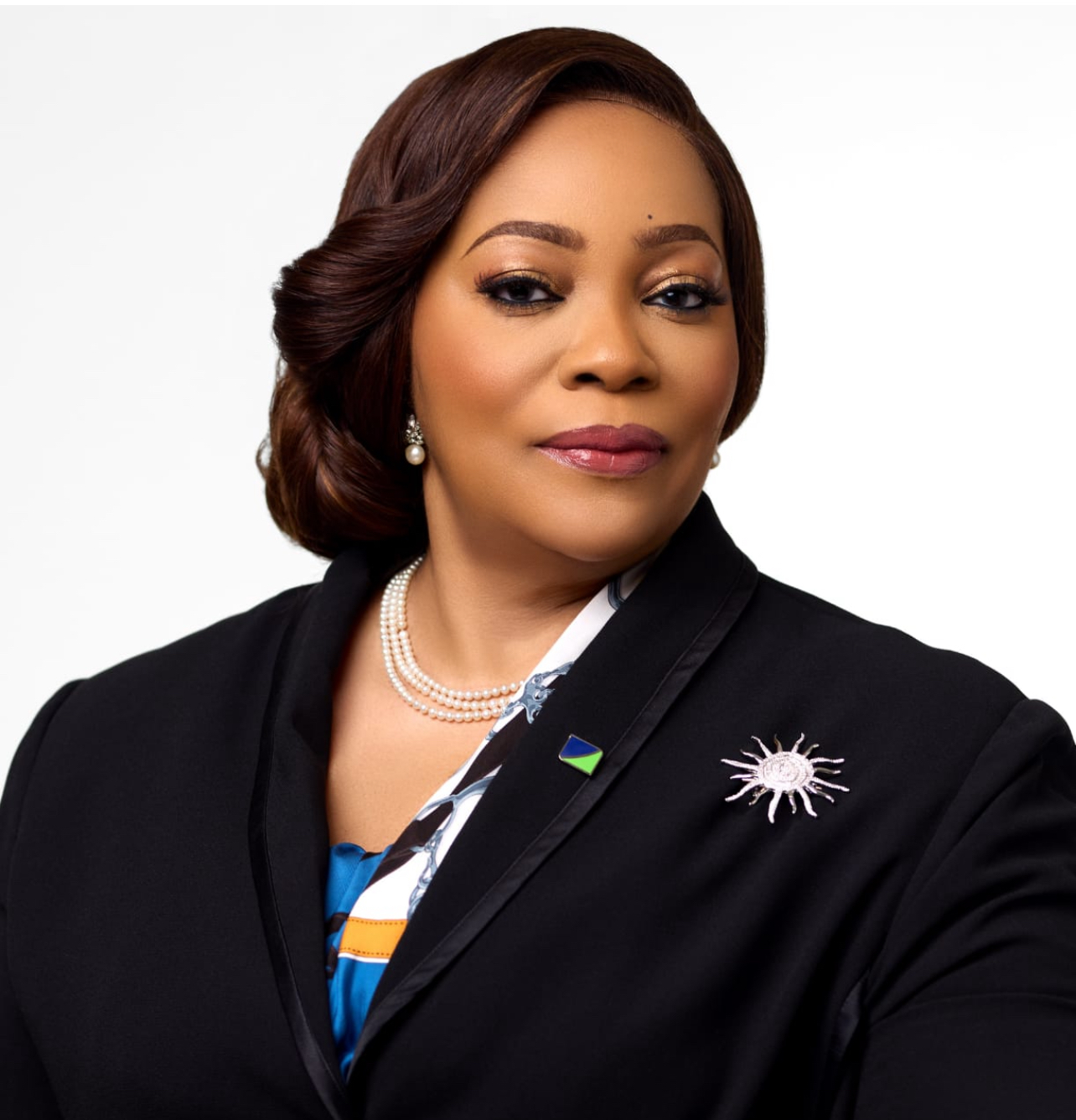
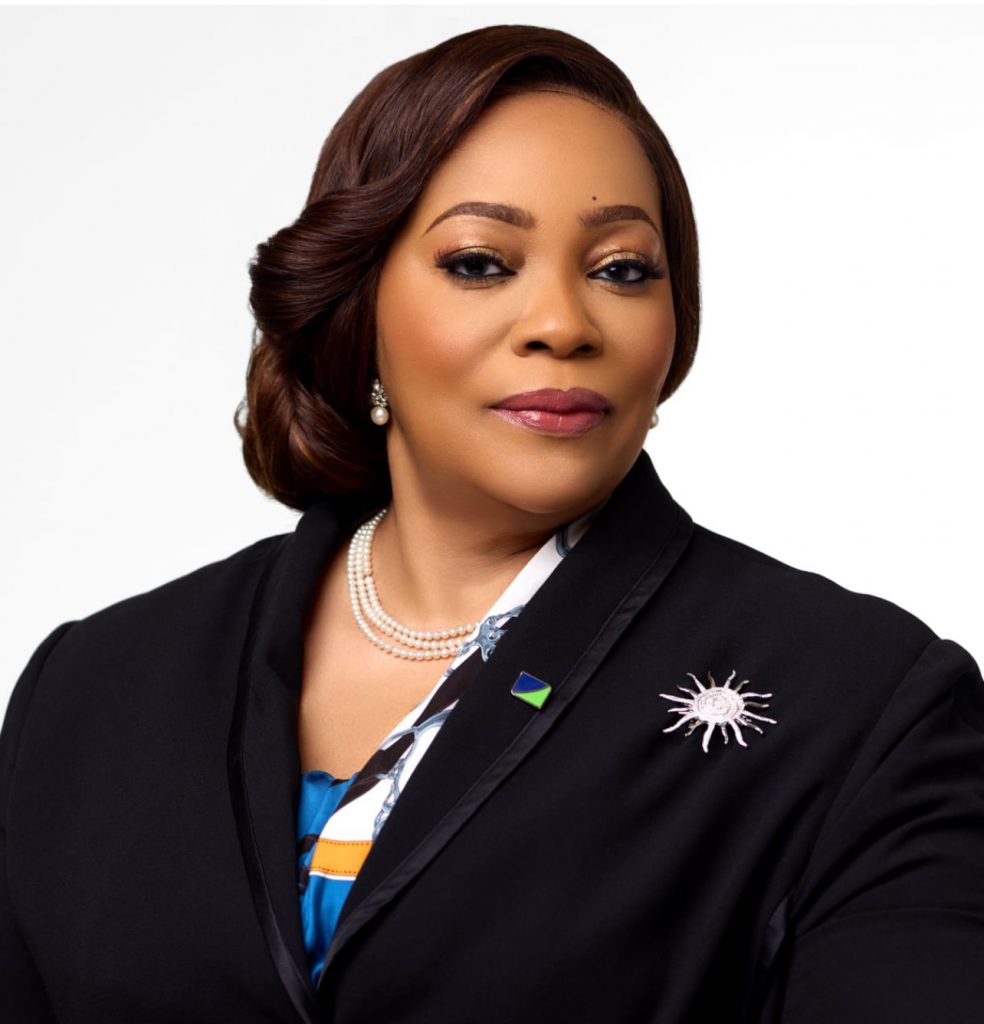 Tier one lender, Fidelity Bank Plc, has announced the completion of the tenure of Mr. Mustafa Chike-Obi as Chairman of its Board of Directors effective December 31, 2025, and the appointment of Mrs. Amaka Onwughalu as the new Chairman of the Board, effective January 1, 2026.
Tier one lender, Fidelity Bank Plc, has announced the completion of the tenure of Mr. Mustafa Chike-Obi as Chairman of its Board of Directors effective December 31, 2025, and the appointment of Mrs. Amaka Onwughalu as the new Chairman of the Board, effective January 1, 2026.
The board transitions are in alignment with the Bank’s policy and have been communicated to the Central Bank of Nigeria, the Nigerian Exchange Group, and other stakeholders.
Under Mr. Chike-Obi’s leadership, Fidelity Bank repaid its Eurobond, completed the first tranche of its public offer and rights issue that were oversubscribed by 237 percent and 137.73 percent respectively, expanded internationally to the United Kingdom, and received improved ratings from various agencies amongst a long list of achievements. His tenure also saw the Bank strengthen its capital position, record steady growth in customer deposits and total assets, deepen its digital banking capabilities, and enhance its corporate and investment banking proposition. The bank equally made notable progress in governance, risk management, and operational efficiency, all of which contributed to strengthened market confidence and the Bank’s sustained upward performance trajectory.
Reflecting on his tenure, Mr. Mustafa Chike-Obi said, “It has been a privilege to serve as Chairman of Fidelity Bank. The dedication of our Board, management, and staff has enabled us to reach significant milestones. I am confident that the Bank will continue to thrive and deliver value to all stakeholders.”
Mrs. Amaka Onwughalu’s appointment marks a new chapter for Fidelity Bank. She joined the Board in December 2020 and has chaired key committees. With over 30 years of banking experience, including executive roles at Mainstreet Bank Limited and Skye Bank Plc. She holds degrees in Economics, Corporate Governance, and Business Administration, and has attended executive programmes at global institutions. Mrs. Onwughalu is a Fellow of several professional bodies and has received awards for accountability and financial management
“I am honoured to lead the Board of Fidelity Bank at this exciting time. Our recent achievements have set a strong foundation for continued growth. I look forward to working with my colleagues to drive our strategy and deliver sustainable value,” commented Mrs. Onwughalu.
Ranked among the best banks in Nigeria, Fidelity Bank Plc is a full-fledged Commercial Deposit Money Bank serving over 9.1 million customers through digital banking channels, its 255 business offices in Nigeria and United Kingdom subsidiary, FidBank UK Limited.
The Bank is a recipient of multiple local and international Awards, including the 2024 Excellence in Digital Transformation & MSME Banking Award by BusinessDay Banks and Financial Institutions (BAFI) Awards; the 2024 Most Innovative Mobile Banking Application award for its Fidelity Mobile App by Global Business Outlook, and the 2024 Most Innovative Investment Banking Service Provider award by Global Brands Magazine. Additionally, the Bank was recognized as the Best Bank for SMEs in Nigeria by the Euromoney Awards for Excellence and as the Export Financing Bank of the Year by the BusinessDay Banks and Financial Institutions (BAFI) Awards.
-

 news5 years ago
news5 years agoUPDATE: #ENDSARS: CCTV footage of Lekki shootings intact – Says Sanwo – Olu
-

 lifestyle6 years ago
lifestyle6 years agoFormer Miss World: Mixed reactions trail Agbani Darego’s looks
-

 health5 years ago
health5 years agoChairman Agege LG, Ganiyu Egunjobi Receives Covid-19 Vaccines
-

 lifestyle4 years ago
lifestyle4 years agoObateru: Celebrating a Quintessential PR Man at 60
-

 health6 years ago
health6 years agoUPDATE : Nigeria Records 790 new cases of COVID-19
-

 health6 years ago
health6 years agoBREAKING: Nigeria confirms 663 new cases of COVID-19
-

 entertainment1 year ago
entertainment1 year agoAshny Set for Valentine Special and new Album ‘ Femme Fatale’
-

 news9 months ago
news9 months agoBREAKING: Tinubu swears in new NNPCL Board


